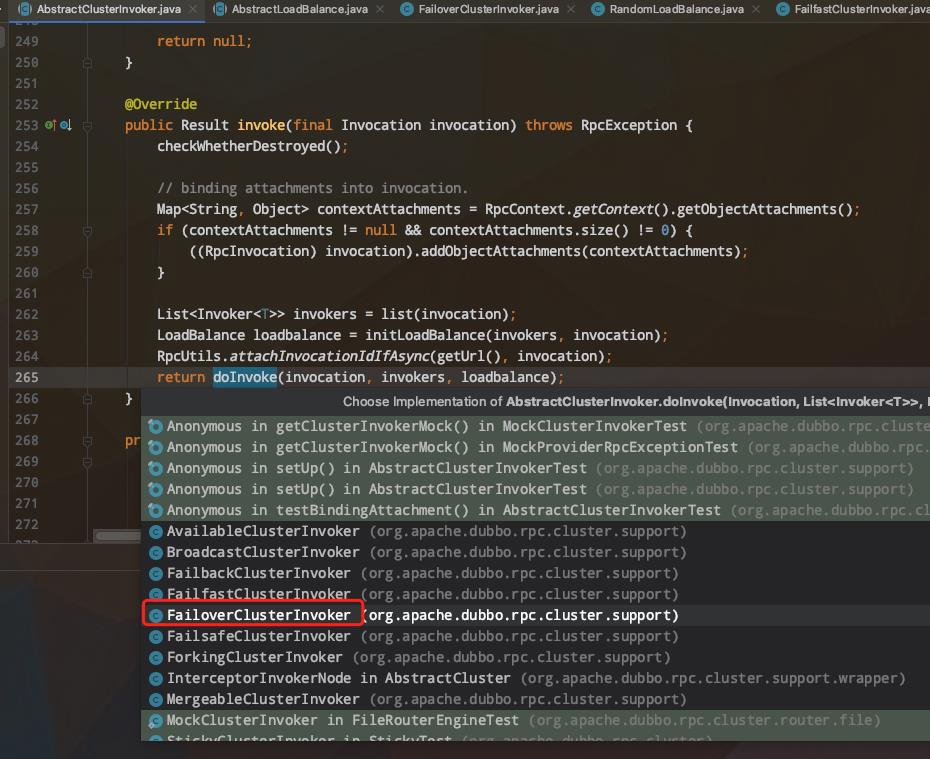源码走读:Dubbo带权重的随机负载均衡算法与warmup
Posted Jeff.S
tags:
篇首语:本文由小常识网(cha138.com)小编为大家整理,主要介绍了源码走读:Dubbo带权重的随机负载均衡算法与warmup相关的知识,希望对你有一定的参考价值。
在分布式架构中,当下游服务端刚启动时可能并不能承载上游瞬间大流量过来,通过warmup的机制,客户端可以根据下游服务端启动时间进行缓慢预热配比放量。而dubbo就通过注册启动时间戳的方式告知调用方自己的启动时间,客户端据此进行预热配比放量,避免对服务端造成重启!
这篇文章是承接上一篇文章:Dubbo如何实现基于http的jsonrpc调用。上篇中介绍了关于Dubbo中如何对jsonrpc进行http调用。最后我们提到了Dubbo默认的集群容错模式是failover。这里看下 边这个图中即将执行org.apache.dubbo.rpc.cluster.support.FailoverClusterInvoker#doInvoke方法。

进入 FailoverClusterInvoker#doInvoke方法中会执行到下边这行,用于选择目标节点的invoker对象。我们这一篇文章就重点分析下这个invoker是怎么来的?
//FailoverClusterInvoker.java
Invoker<T> invoker = select(loadbalance, invocation, copyInvokers, invoked);
我们只选取关键代码:
//FailoverClusterInvoker.java
protected Invoker<T> select(LoadBalance loadbalance, Invocation invocation,
List<Invoker<T>> invokers, List<Invoker<T>> selected) throws RpcException {
.....
Invoker<T> invoker = doSelect(loadbalance, invocation, invokers, selected);
...
return invoker;
}
而在doSlelect方法中又调用了loadbalance#select方法:
//AbstractClusterInvoker#doSelect
private Invoker<T> doSelect(LoadBalance loadbalance, Invocation invocation,
List<Invoker<T>> invokers, List<Invoker<T>> selected) throws RpcException {
......
Invoker<T> invoker = loadbalance.select(invokers, getUrl(), invocation);
....
return invoker;
}
由dubbo-cluster中的AbstractLoadBalance.java类提供了这个select方法:
//AbstractLoadBalance#select
@Override
public <T> Invoker<T> select(List<Invoker<T>> invokers, URL url, Invocation invocation) {
if (CollectionUtils.isEmpty(invokers)) {
return null;
}
if (invokers.size() == 1) {
return invokers.get(0);
}
return doSelect(invokers, url, invocation);
}
protected abstract <T> Invoker<T> doSelect(List<Invoker<T>> invokers, URL url, Invocation invocation);
可以看到里边有一个模板方法doSelect,即这里使用了模板模式。具体实现由子类提供,那么AbstractLoadBalance的子类有哪些呢?有下边5种:
org.apache.dubbo.rpc.cluster.loadbalance.ConsistentHashLoadBalance
org.apache.dubbo.rpc.cluster.loadbalance.LeastActiveLoadBalance
org.apache.dubbo.rpc.cluster.loadbalance.RandomLoadBalance
org.apache.dubbo.rpc.cluster.loadbalance.RoundRobinLoadBalance
org.apache.dubbo.rpc.cluster.loadbalance.ShortestResponseLoadBalance
这里我们找一个最简单的看一下比如这里的随机负载均衡算法:
//RandomLoadBalance#doSelect
/**
* Select one invoker between a list using a random criteria
* @param invokers List of possible invokers
* @param url URL
* @param invocation Invocation
* @param <T>
* @return The selected invoker
*/
@Override
protected <T> Invoker<T> doSelect(List<Invoker<T>> invokers, URL url, Invocation invocation) {
// Number of invokers
int length = invokers.size();
// Every invoker has the same weight?
boolean sameWeight = true;
// the maxWeight of every invokers, the minWeight = 0 or the maxWeight of the last invoker
int[] weights = new int[length];
// The sum of weights
int totalWeight = 0;
for (int i = 0; i < length; i++) {
//获取下游服务权重
int weight = getWeight(invokers.get(i), invocation);
// Sum
totalWeight += weight;
// save for later use
weights[i] = totalWeight;
if (sameWeight && totalWeight != weight * (i + 1)) {
sameWeight = false;
}
}
if (totalWeight > 0 && !sameWeight) {
// If (not every invoker has the same weight & at least one invoker's weight>0), select randomly based on totalWeight.
int offset = ThreadLocalRandom.current().nextInt(totalWeight);
// Return a invoker based on the random value.
for (int i = 0; i < length; i++) {
if (offset < weights[i]) {
return invokers.get(i);
}
}
}
// If all invokers have the same weight value or totalWeight=0, return evenly.
return invokers.get(ThreadLocalRandom.current().nextInt(length));
}
这是带权重的随机算法,使用int数组weights来存储不同下游节点的权重值,长度自然就是下游节点的个数。最后在从invokers列表选择invoker的时候,通过计算总权重的随机offset位移值来获取invoker。
int offset = ThreadLocalRandom.current().nextInt(totalWeight);
看注释可以知道,这是为了防止invokers列表中所有invoker的权重weight值之和小于等于0的情况,这种情况下没必要进行权重随机了,直接根据invokers列表长度随机就行了。
// If all invokers have the same weight value or totalWeight=0, return evenly.
return invokers.get(ThreadLocalRandom.current().nextInt(length));
总体上,这个RandomLoadBalance#doSelect方法逻辑很简单。但其中循环获取每个invoker的权重这个方法需要引起重视。因为这个方法在下游节点配置了启动时间戳TIMESTAMP_KEY的情况下会进行warmup配比放量。也就是当下游服务端刚启动时可能并不能承载上游瞬间大流量过来,通过warmup的机制,客户端可以根据下游服务端启动时间进行缓慢预热配比放量。
//AbstractLoadBalance.java提供
int weight = getWeight(invokers.get(i), invocation);
String TIMESTAMP_KEY = "timestamp";
//AbstractLoadBalance.java提供
/**
* 获取考虑预热时间的情况下的调用权重值,如果下游服务的uptime启动时间在warmup预热时间内,那么下游服务的权重将会被减少!
*
* @param invoker the invoker
* @param invocation the invocation of this invoker
* @return weight
*/
int getWeight(Invoker<?> invoker, Invocation invocation) {
int weight;
URL url = invoker.getUrl();
// Multiple registry scenario, load balance among multiple registries.
if (REGISTRY_SERVICE_REFERENCE_PATH.equals(url.getServiceInterface())) {
weight = url.getParameter(REGISTRY_KEY + "." + WEIGHT_KEY, DEFAULT_WEIGHT);
} else {
weight = url.getMethodParameter(invocation.getMethodName(), WEIGHT_KEY, DEFAULT_WEIGHT);
if (weight > 0) {
long timestamp = invoker.getUrl().getParameter(TIMESTAMP_KEY, 0L);
if (timestamp > 0L) {
long uptime = System.currentTimeMillis() - timestamp;
if (uptime < 0) {
return 1;
}
//下游服务默认权重值100
int warmup = invoker.getUrl().getParameter(WARMUP_KEY, DEFAULT_WARMUP);
//下游启动时间大于0且小于预热时间阈值则减少下游服务权重
if (uptime > 0 && uptime < warmup) {
weight = calculateWarmupWeight((int)uptime, warmup, weight);
}
}
}
}
return Math.max(weight, 0);
}
/**
* Calculate the weight according to the uptime proportion of warmup time
* the new weight will be within 1(inclusive) to weight(inclusive)
*
* @param uptime the uptime in milliseconds
* @param warmup the warmup time in milliseconds
* @param weight the weight of an invoker
* @return weight which takes warmup into account
*/
static int calculateWarmupWeight(int uptime, int warmup, int weight) {
int ww = (int) ( uptime / ((float) warmup / weight));
return ww < 1 ? 1 : (Math.min(ww, weight));
}
到此为止,我们分析了从FailoverClusterInvoker#doInvoke一路下来到RandomLoadBalance#doSelect方法。有什么疑问多多交流!
以上是关于源码走读:Dubbo带权重的随机负载均衡算法与warmup的主要内容,如果未能解决你的问题,请参考以下文章